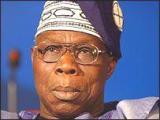AU head asks Sudan government, Darfur rebels to allow aid access
ABUJA, Sept 17 (AFP) — Nigerian President and current African Union chair Olusegun Obasanjo has urged Khartoum and rebel groups to sign a pact that would give aid agencies free access to Sudan’s Darfur region, where war has forced 1.4 million people from their homes, an official said Friday.
 In an effort to kickstart the slow-moving talks, Obasanjo met the heads of the Sudanese government and rebel delegations at the talks late Thursday in the presence of the AU mediators.
In an effort to kickstart the slow-moving talks, Obasanjo met the heads of the Sudanese government and rebel delegations at the talks late Thursday in the presence of the AU mediators.
“The meeting went fine, but we have yet to get the final response of the rebel movements. President Obasanjo asked them to think well and to sign the protocol on humanitarian affairs,” said the head of the mediation team, Hamid Algabid.
The AU-brokered talks began on August 23 but have made little headway since then.
Negotiations on security and disarmament have been stalled for two weeks and the mediators are now struggling to get the rebels and Khartoum to sign an accord concluded on September 2, which would give free access by UN agencies and non-governmental organisations to the estimated 1.2 million displaced in Darfur, a region as big as France.
Another 200,000 have sought refuge across the border in Chad.
The spokesman of the larger of the two rebel groups, the Sudan Liberation Movement (SLM), Abduljabbar Dofa, told AFP: “The position of our movement will be made known at 3:00 pm (1400 GMT) today.”
The SLM asked the mediators for a 24-hour break in the talks to allow it to consult with its members in Darfur. The AU granted the request.
Ahmed Mohammed Tugod, the chief negotiator for the other rebel group, the Justice and Equality Movement (JEM), told AFP that the two rebel movements would “meet the AU mediators on the issue later today (Friday)”.
The war in Darfur broke out in February 2003 when rebels rose up against Khartoum to demand an end to the political and economic marginalisation of their region, peopled mainly by black Africans.
Khartoum’s response was to back an Arab militia group, known as the Janjaweed, and give it a free rein to crack down on the rebels and their backers. In the 19 months since the conflict began, some 50,000 people have been killed, according to UN estimates.
The Janjaweed has been accused of conducting a scorched earth policy in Darfur, of ethnic cleansing and even, in tandem with Khartoum, of genocide — an accusation made last week by US Secretary of State Colin Powell.
The United States has brought a resolution on Darfur before the UN Security Council, threatening to levy sanctions on Sudan’s oil industry if Khartoum does not take steps to end the carnage in its western region.
UN Secretary General Kofi Annan on Thursday called on the Security Council to act immediately on the resolution.
“Civilians are still being attacked and fleeing their villages even as we speak,” Annan said. “I have urged the Security Council to act on the draft resolution without delay, and to be as united as possible.”
China has threatened to veto the resolution, which presses Khartoum to rein in the Janjaweed and calls for an expanded force of African Union monitors in Darfur.
